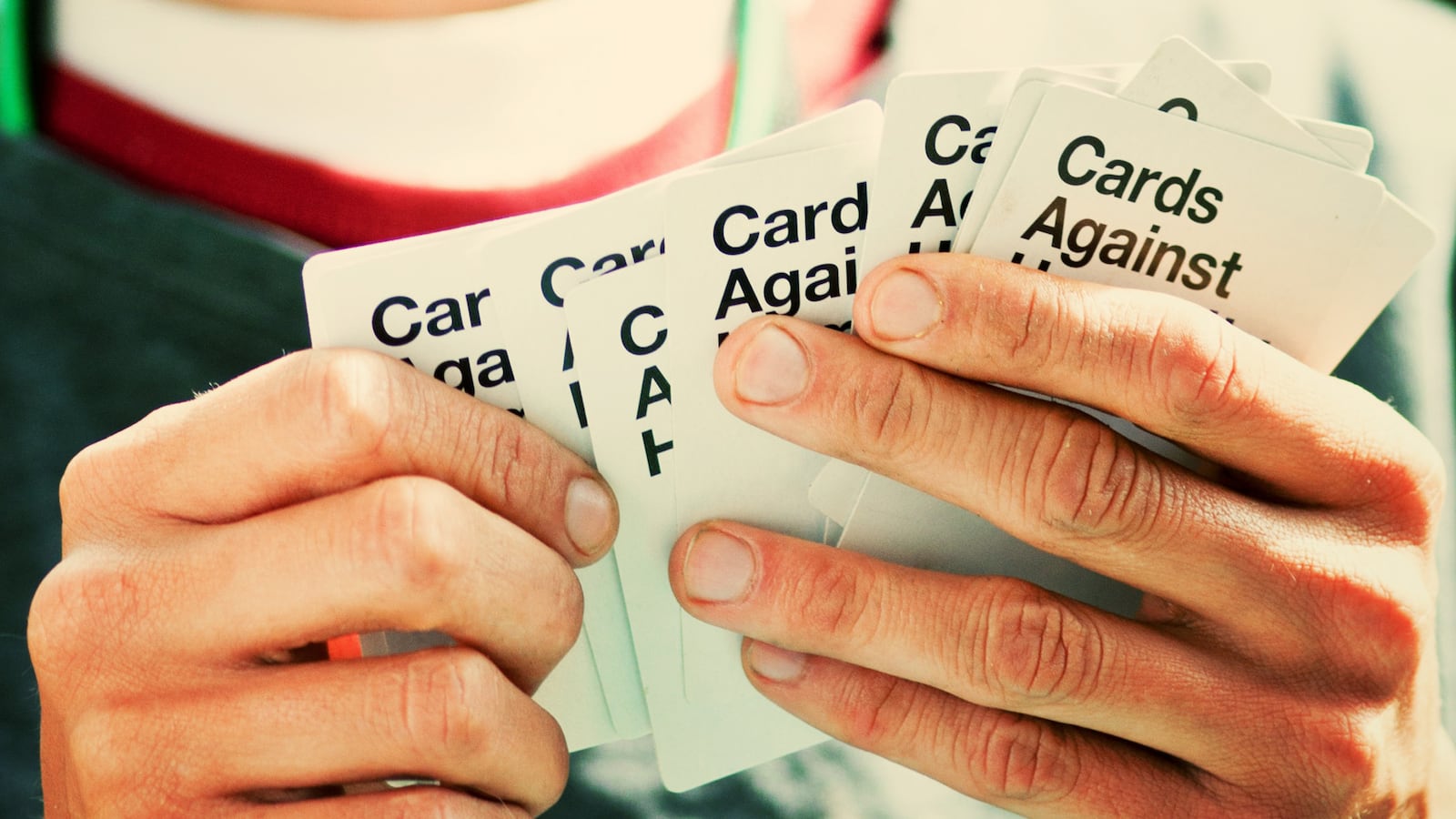It says so right on the box the deck of cards comes in. “Cards Against Humanity: A party game for horrible people.”
The easiest way to explain Cards Against Humanity’s premise to newbies is “no-limits” Apples to Apples. It’s for people who have always been frustrated that Apples to Apples deliberately left out questions like “How did I lose my virginity?” and the incendiary possibilities of answering them with cards like “Eugenics,” “AIDS,” and “Binging and purging.” People who are constantly suppressing the urge to make the most obscene, offensive jokes that spring to mind. People for whom a game that openly invites such jokes is a liberating catharsis.
You know, horrible people. People like me.
Like so many others in the nerd world, I fell in love with Cards Against Humanity through its Kickstarter preview in 2011. When the game sold out almost immediately upon release, I took the initiative to download a free PDF from the creators’ website and pay a local print shop to make my own deck.
Since then I’ve bought the game several times and given it to siblings and friends. I’ve played it at video game conventions with strangers dressed like superheroes. I’ve played it with dear friends on living room couches and apartment floors. I have exactly the kind of sense of humor—pitch-black, transgressive, honed from years of Twitter snark and Onion headlines—that the game was designed around and I almost always win. I patted myself on the back with the knowledge that by financially supporting the Cards Against Humanity creators I was supporting progressive causes and worthy charities, that Cards Against Humanity was the kind of endeavor geekdom could be proud of.
Until Sunday, July 13, when a Tumblr user under the pseudonym “Magz” accused Max Temkin, the co-creator and public face of Cards Against Humanity, of raping her in college eight years ago.
Max Temkin replied with a vague, deflecting denial of guilt/non-apology, other people replied with dissections and criticisms of his reply, and in general the gaming community has been in uproar.
It doesn’t help that Temkin had positioned himself as an ally of progressive, feminist gamers, to the point of openly taking a stance against gamer icons Tycho and Gabe of Penny Arcade for making rape jokes while he had a booth at the Penny Arcade Expo. Now Temkin’s progressive fans are left wondering if they backed the wrong horse while his anti-feminist detractors are having a schadenfreude party.
So what do I, a relative outsider to the indie game dev community, have to add to this fraught conversation?
Just that I personally am probably never going to play Cards Against Humanity again.
This isn’t about whether Temkin is guilty, though my tendency is in fact to side with the accuser in instances like this where further evidence is unlikely to come out, and I side with Kelly Kend that this is most likely one of those issues of “ambiguous consent” where a superficially decent, nice, progressive guy “accidentally” violates a girl that are all too common on college campuses.
But even if unequivocal proof comes out tomorrow that Magz is lying and Temkin is completely innocent, I’ll probably quit playing anyway.
You see, I’ve been having second thoughts about Cards Against Humanity for a while now, and about satire in general. In my younger years I was such a fan of satire and of defending controversial, offensive art as “satire” that it’s strange I’ve done an almost complete 180. I’ve been wondering if satire isn’t a bad thing in and of itself.
The often-cited problem, as master satirist Tom Lehrer has pointed out (referencing master satirist Peter Cook before him), is that satire always preaches to the choir. It requires you to get the joke to understand it, and the people most likely to get the joke are those who already share the satirist’s opinion. Indeed, the ease of missing the point of satire is part of the point. Satire isn’t intended to teach so much as to test. It’s a way to filter out smart people who share your beliefs from the dumb masses who don’t.
If The Onion were, say, trying to convince Christian fundamentalists of the error of their ways, then fundamentalists thinking an Onion article claiming J.K. Rowling is a practicing Satanist was real news would be a failure. Instead, it’s a victory, because the point was always for The Onion’s educated, liberal, secular audience to read such stories and pat themselves on the back for finding an article mimicking Christian fundamentalist conspiracy theories ridiculous because they already find Christian fundamentalism ridiculous.
Just like Colbert Nation isn’t about sincerely convincing conservatives they’re wrong, it’s about liberals congratulating themselves on being liberals—on being the kind of person who can readily tell the fake “Stephen Colbert” character is a bad person and that his opinions are wrong and therefore laugh at the spectacle of them being presented sincerely.
That’s why we get so mad at hashtag activists who “don’t get the joke.” By taking the joke “literally” Suey Park was attacking us by questioning our “Of course I’m not racist” cred, by daring to ask whether we might be the “wrong” audience for such a joke.
And nothing gets people more defensive than asking them to consider that they might be horrible people.
It was that question—after seeing a white crew member laughing uproariously at a sketch involving prancing in blackface—that made Dave Chappelle pull the plug on his enormously successful TV show and upend his career, asking himself if he was “dancing and not shuffling.” Norman Lear had a crisis while filming All in the Family about people genuinely taking Archie Bunker as a role model. Stephen Colbert has conservative fans who see him as standing up for conservative values (I have had people seriously argue this to my face).
That awkward moment when you wonder not just “Who did I just offend?” but “Who did I just encourage?” ought to give all satirists pause. And Cards Against Humanity, as a do-it-yourself kit for amateur satirists that also bills itself as an icebreaker party game, is a wall-to-wall extravaganza of such moments.
You see, the tagline on Cards Against Humanity’s box is a lie. The game isn’t for horrible people. It’s designed to reassure you that you aren’t a horrible person. That’s the whole point.
When I play a card combo like “What will always get you laid? Date rape,” I’m asking the women at the table to trust that I’m a good, decent guy who doesn’t actually commit date rape or find date rape funny. I’m asking them to get the joke, which is that obviously we all think rape is horrible and therefore me being flip about it is shockingly hilarious.
We spend the evening exchanging these tacit assurances. It functions as an icebreaker the same way trust-fall exercises do. Put us in a situation where we have no choice, and peer pressure means we generally will cave in and trust relative strangers with our physical safety. Cards Against Humanity is the social version of this, getting us to trust that the other players at the table are decent people who share our values.
But what if they’re not?
Temkin offered to make the Cards Against Humanity booth a “safe space” for sexual assault survivors during the Penny Arcade Expo, and did this with a totally straight face despite “Date rape,” “Roofies” and “Surprise sex” all being cards in Cards Against Humanity at some point in time. The logic, I suppose, being that it wasn’t the content of a game that made a space “safe” or “unsafe” but the degree you could trust the people running it.
(Max Temkin did publicly apologize for certain cards and remove them from the deck a while ago, including the original "Date rape" and "Roofies" cards. However, if you look at the free PDF of Cards Against Humanity online, the cards "Pedophiles," "Surprise sex!" and "Copping a feel" are still there.)
Well, now the supposedly progressive sensitive archfeminist Max Temkin, who assured us all the offensive content in Cards Against Humanity was “ironic,” has had that trust called into question. And this accusation, whether true or false, points up how much unwarranted trust the game itself was asking us to hand over, not just to Max Temkin but to whomever you happen to be playing with.
Every time I play “Surprise sex” as a punchline in Cards Against Humanity I have no way of actually knowing why anyone in particular is laughing. I have no way of knowing if I’m making a rape joke with an actual rapist. But if I play enough pickup games of Cards Against Humanity, someday eventually I will. Hell, even if I only ever play with close friends that I trust, that’s no guarantee—I really, really don’t want to think any of my friends are rapists, but how would I know?
Just like I want to believe that we’re all laughing at jokes about “black people” or “The Third World” purely because they’re horrible and not because some tiny part of us enjoys the schadenfreude of being able to make the joke and not be the one joked about. I want to believe games that devolve into crudely insulting each other based on our sore spots are truly meant “in fun” and not a socially approved way to get away with bullying. I want to believe everyone’s motives are pure, even though I honestly don’t even know that about my own motives.
I want to believe that I can have absolute confidence that neither I nor any other people around me are horrible. Cards Against Humanity is built on that wishful thinking.
Max Temkin is credited with creating another game, Humans vs. Zombies, where students on a college campus reenact a zombie apocalypse. Many have pointed out that if a zombie apocalypse were to really happen, having ordinary people going around pretending to be zombies would be disastrously irresponsible. How could you tell the real, dangerous zombies apart from the harmless fakers?
Well, Cards Against Humanity isn’t a game for horrible people. It’s a game where people have fun by pretending to be horrible people.
And unlike with Temkin’s other game, this is a serious problem. Because unlike zombies, horrible people are all too real.
Editor's note: The first draft of this article had the phrase "(Does It Matter?)" in the headline. That has since been restored.





